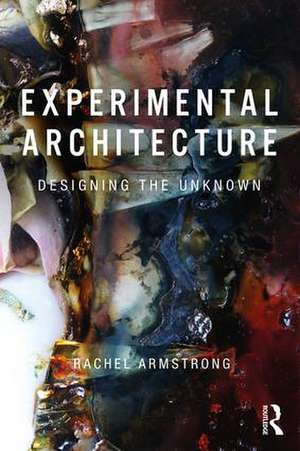Experimental Architecture: Designing the Unknown
Autor Rachel Armstrongen Limba Engleză Paperback – 28 iun 2019
Written by an acknowledged pioneer of architectural experiment, this visionary book is ideal for students and researchers wishing to engage in experimental, practice-based architectural and artistic research. It introduces radical new ideas about architecture and provides ideas and inspiration which students and researchers can apply in their own work and proposals, while practitioners can draw on it to transform their creative assumptions and develop thereby a distinctive "edge" to stand out in a highly competitive profession.
| Toate formatele și edițiile | Preț | Express |
|---|---|---|
| Paperback (1) | 247.58 lei 6-8 săpt. | |
| Taylor & Francis – 28 iun 2019 | 247.58 lei 6-8 săpt. | |
| Hardback (1) | 764.20 lei 6-8 săpt. | |
| Taylor & Francis – 25 iun 2019 | 764.20 lei 6-8 săpt. |
Preț: 247.58 lei
Preț vechi: 296.44 lei
-16% Nou
Puncte Express: 371
Preț estimativ în valută:
47.38€ • 49.69$ • 39.44£
47.38€ • 49.69$ • 39.44£
Carte tipărită la comandă
Livrare economică 01-15 aprilie
Preluare comenzi: 021 569.72.76
Specificații
ISBN-13: 9781138575257
ISBN-10: 1138575259
Pagini: 228
Ilustrații: 4 Line drawings, black and white; 20 Halftones, black and white; 24 Illustrations, black and white
Dimensiuni: 156 x 234 x 10 mm
Greutate: 0.46 kg
Ediția:1
Editura: Taylor & Francis
Colecția Routledge
Locul publicării:Oxford, United Kingdom
ISBN-10: 1138575259
Pagini: 228
Ilustrații: 4 Line drawings, black and white; 20 Halftones, black and white; 24 Illustrations, black and white
Dimensiuni: 156 x 234 x 10 mm
Greutate: 0.46 kg
Ediția:1
Editura: Taylor & Francis
Colecția Routledge
Locul publicării:Oxford, United Kingdom
Public țintă
Postgraduate, Professional, and UndergraduateCuprins
1. Architecture and Research Rachel Armstrong 1.1 Experimental Architecture Reader 1.2 Architecture as Discipline 1.3 Neoliberalism as Worldview 1.4 Ways of Knowing 1.5 Research 1.6 Nature of Architectural Research 1.7 Evaluation 1.8 Impact 1.9 Outreach 1.10 Research Environment 1.11 Research Context 1.12 Economic Importance of Architectural Research 1.13 Principles of Architectural Research: A "wicked" discipline 1.13.1 Personal Exploration 1.13.2 Academic Environment 1.13.3 Research and Education 1.13.4 Professional Practice 2. Experimental Architecture Rachel Armstrong 2.1 Designing Change 2.2 Experiments versus "Wicked" Experiments 2.3 Introducing Experimental Architecture 2.4 Ethics 2.5 Research Principles of Experimental Architecture 2.5.1 The Role of Apparatuses 2.5.2 Sorting, Ordering and Valuing 2.5.3 Laboratory Environments 2.5.4 Monstering 2.5.5 Question-making 2.6 Towards an Ecological Architecture 2.6.1 The Houme 3. Architectural Experiments 3.1 Short Experiments 3.1.1 Harvested Sunlight: An experiment with a novel photoautotrophic biomaterial Simon Park and Victoria Geaney 3.1.2 SuperTree Claudia Pasquero and Marco Poletto 3.1.3 Co-Occupancy Joyce Hwang 3.1.4 PolyBrick 3.0: DNA glaze and digital ceramics Jenny Sabin 3.1.5 Graphene Architecture: Integrated intelligence in soft responsive skins Areti Markopoulou 3.1.6 High-Resolution Architecture Designed/Built by Humans/AI/Robots Alisa Andrasek 3.1.7 Tempietto on Mylar T+E+A+M 3.018 Nightly Catie Newell 3.2 Long Experiments 3.2.1 Evolving, Growing, and Gardening Cyber-physical Systems Susan Stepney and colleagues 3.2.2 About the Architecture of the Human Mind: A mathematical experiment Françoise Chatelin 3.2.3 Nomadic Hamlet 2.0: Testing place and video space for audiences Esther M. Armstrong and Dick Straker 3.2.4 Exaptive Design: Radical co-authorship as method Simone Ferracina 3.2.5 The Cloud Chamber Andrew Ballantyne 3.2.6 The Third Thing Rolf Hughes 4. Afterword Rachel Armstrong
Notă biografică
Rachel Armstrong is Professor of Experimental Architecture at Newcastle University. Her work focuses on establishing the conditions for a "living" architecture that couples the computational properties of the natural world with building structures and infrastructures. She is Director and founder of the Experimental Architecture Group (EAG) whose work has been published, exhibited and performed at international biennales, and Coordinator for the Living Architecture project, which is an ongoing collaboration of experts from universities in the UK, Spain, Italy and Austria. She has written a number of academic books including: Liquid Life: On Non-Linear Materiality (2019);Soft Living Architecture: An Alternative View of Bio-informed Practice (2018); Star Ark: A Living, Self-Sustaining Spaceship (2016); Vibrant Architecture: Matter as a CoDesigner of Living Structures (2015). Her fiction books include Invisible Ecologies (2019) and Origamy (2018).
Descriere
Written by a pioneer in the field, this is the first book to provide an overview of the theory and practice of experimental architecture. Ideal for students and researchers wishing to engage in experimental, practice-based architectural research.
